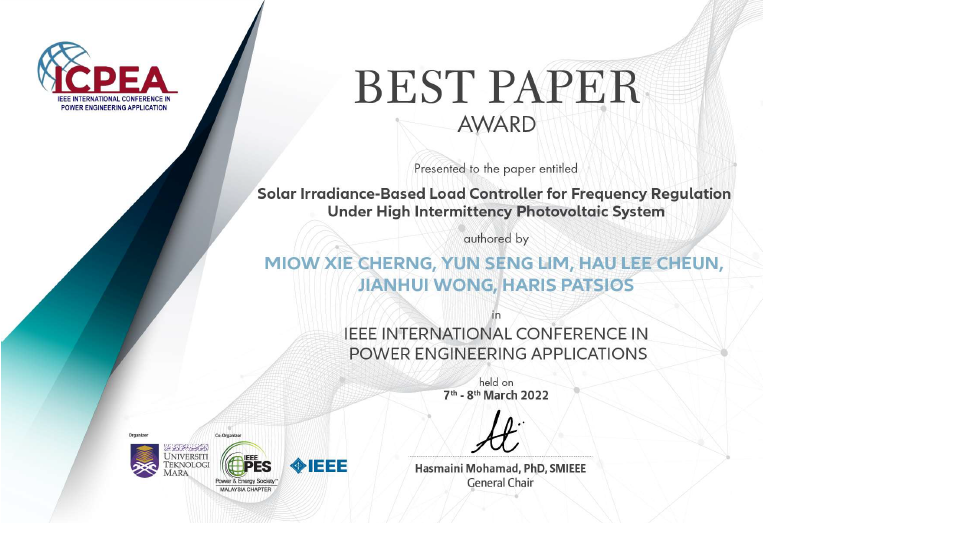
Best Paper Award at ICPEA

The award certificate
Lee Kong Chian Faculty of Engineering and Science (LKC FES) Doctor of Philosophy (Engineering) student Miow Xie Cherng and LKC FES academics Dr Hau Lee Cheun, Ir Prof Dr Lim Yun Seng and Assoc Prof Ir Dr Wong Jianhui won Best Paper Award at IEEE International Conference in Power Engineering Applications (ICPEA).
The international conference was held on 7 and 8 March 2020. It was organised by Universiti Teknologi Mara and co-sponsored by IEEE Power & Energy Society (PES), Malaysia Chapter. The research paper titled, Solar Irradiance-Based Load Controller for Frequency Regulation under High Intermittency Photovoltaic System, was also co-authored by Dr Haris Patsios from the Newcastle University.
Dr Hau explained, “The power output of photovoltaic systems (PVs) in Malaysia is highly intermittent due to its location near the equatorial region that is susceptible to many passing clouds. High intermittency of PV increases the mismatch between power generation and demand. This would lead to frequency issues such as frequency excursions and a high rate of change of frequency (ROCOF). Several methods have been proposed to mitigate these issues, and demand-side management (DSM) has been central due to its lower deployment costs than other methods. DSM controls the electrical consumption of loads at the distribution level to regulate the system frequency.”
He added, “Conventionally, researchers have designed the DSM load controller based on actual PV power output. However, such data may not be commonly available compared to solar irradiance. Hence, the stated research paper presents a solar irradiance-based load controller for frequency regulation under high intermittency of PV. The preliminary results of the experiments conducted in UTAR Sungai Long show that the proposed controller has a comparable performance versus a load controller that uses the actual PV power output data for frequency regulation. It can also maintain the system frequency well within the statutory limit of 50 Hz ± 1% and reduce the ROCOF by 0.033 Hz/s compared to the baseline when no load controller is used.”
Project Leader, Prof Lim said, “Affordable and reliable supply of electricity plays an important role in the economic growth of the country. Additionally, promoting renewable energy is essential for reducing greenhouse gas emissions. However, electricity tariffs are constantly increasing every year in Malaysia due to the increased power generation and the power networks’ upgrades to cater to the growing maximum demands. Also, a substantial increase in renewable energy can create frequency fluctuations or instability in the power networks. This instability can unintentionally shut down power plants, causing an interruption to the power supply. Therefore, several research projects have been conducted by our team to use energy storage systems (ESS) to reduce the maximum demands on grids and maintain the reliability and affordability of electricity supply to customers and power companies.”
Prof Lim continued, “Our ESS solution has also been used to perform frequency regulation to maintain the stability of power grids with PV and other renewable energy sources. Currently, our team is working on developing a novel controller for ESS to perform two functions simultaneously: i) Peak demand reductions for improving the affordability and reliability of supply and ii) Frequency regulation on the network integrated with renewable energy sources. The ESS will be fully controlled on a cloud platform to perform the required functions without using any external control unit to ensure the high reliability of the system. The project aims to help reduce the utility companies’ investment costs by avoiding any new power plants and network reinforcements. It also aims to help customers enjoy relatively low electricity bills due to the reduced maximum demands. The same ESS can also be used to maintain the frequency or stability of the networks under the intermittency of photovoltaic systems. Lastly, it is also worth mentioning that the project is in line with the national policy of Malaysia for providing an all-round solution to the energy trilemma: i) Enhancing the security of energy supply, ii) Promoting environmental sustainability, and iii) Improving the affordability of electricity.”
The researchers enthused, “We want to thank all who have contributed to the research. We are also grateful to receive the award. It shows that the research community recognises our research’s value. We also want to thank UTAR and LKC FES for consistently supporting our team with the opportunity to realise the research.”
The conference aimed to bring together scholars, researchers, policymakers, as well as industries to stimulate exchanges of research findings and panel discussions on various topics in power engineering application. The conference also included keynote speeches and oral presentations of peer-reviewed papers.
© 2022 UNIVERSITI TUNKU ABDUL RAHMAN DU012(A).
Wholly owned by UTAR Education Foundation (200201010564(578227-M)) LEGAL STATEMENT TERM OF USAGE PRIVACY NOTICE